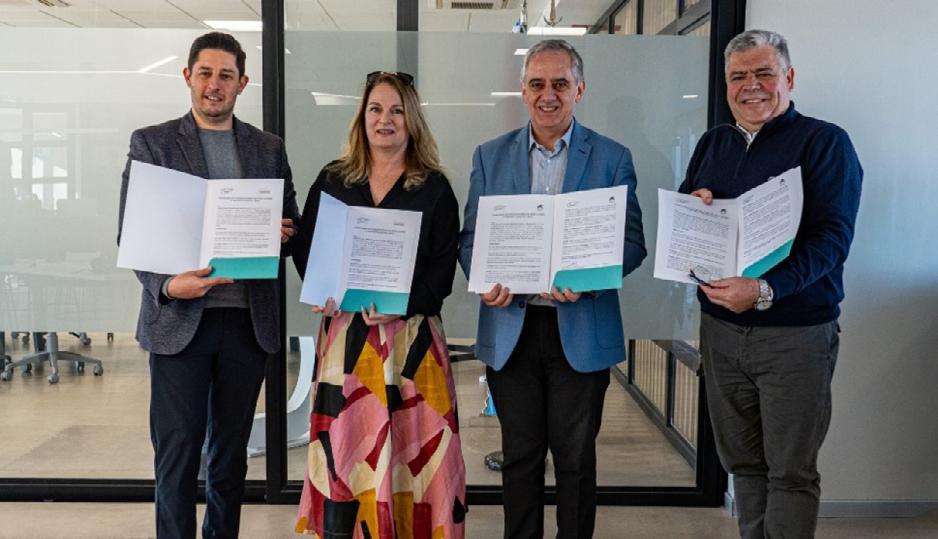GENERAL SITUATION IN MEXICO
Weekly Review I August 13, 2025




Weekly Review I August 13, 2025



• President Claudia Sheinbaum rejected pursuing a bilateral trade agreement with Canada, stating that the USMCA already governs relations.
• Her remarks follow intensified diplomatic engagement between the two nations, sparked by new U.S. tariffs from President Donald Trump.
• Despite Canadian interest in deeper ties, Sheinbaum reaffirmed Mexico’s commitment to the trilateral framework.

• The refusal to explore a bilateral deal may weaken Mexico’s negotiating leverage in future trade disputes.
• Decision comes as the USMCA is scheduled for review, limiting alternative strategies if U.S. trade pressure escalates.
• Business leaders advocate for a trilateral summit at the G7 to address growing regional trade tensions

U.S. Semiconductor Tariffs:
• Trump announced a 100% tariff on imported semiconductors to incentivize domestic manufacturing.
• U.S. companies like Apple may be exempt due to U.S.-based facilities or planned investments.
• Policy aims to reduce reliance on foreign technology, potentially harming countries such as the Philippines and Malaysia.
• Mexican tech exporters tied to global chip supply chains face uncertainty, especially if lacking U.S. production.
• Alongside the semiconductor tariffs, other levies on goods from dozens of countries took effect.
• Mexico avoided a 30% IEEPA tariff for 90 days after negotiations with Washington.
• Long-term exemption depends on resolving non-tariff barriers affecting agriculture, energy, digital services, and intellectual property—key issues for USMCA compliance.
Environmental Cooperation under USMCA:
• On June 17, Mexico, the U.S., and Canada met to review the USMCA’s Environment Chapter.
• Mexico highlighted progress in biodiversity protection, air quality, and ozone preservation.
• Meeting underscored shared regional environmental challenges and the importance of cooperation.
• Sustainability is likely to be a focal point in the upcoming USMCA review.
SOURCE: EL ECONOMISTA
• INITIATIVE WITH DRAFT DECREE TO REFORM AND ADD VARIOUS PROVISIONS TO THE FEDERAL CONSUMER PROTECTION LAW
Presented by: Dip. Ivonne Aracelly Ortega Pacheco (Plur - MC)
Objective: Defines “influencer” in law and establishes advertising transparency rules for digital content.
Status: 2025-08-06 – Published in the Parliamentary Gazette
• INITIATIVE WITH DRAFT DECREE TO REFORM AND ADD VARIOUS PROVISIONS TO THE POLITICAL CONSTITUTION OF THE UNITED MEXICAN STATES
Presented by: Dip. Eruviel Ávila Villegas (PlurPVEM)
Objective: Defines AI in constitutional terms, enables Congress to legislate its use, prohibits tech-based discrimination, and promotes ethical, human rights–oriented AI in areas like health, water, crime prevention, and copyright protection.
Status: 2025-08-06 – Published in the Parliamentary Gazette

• INITIATIVE WITH DRAFT DECREE TO ADD SECTION XXXIV TO ARTICLE 132 OF THE FEDERAL LABOR LAW – BEREAVEMENT LEAVE
Presented by: Dip. Brígido Ramiro Moreno Hernández (Coah - PT)
Objective: Requires employers to grant five paid working days of bereavement leave for the death of family members .
Status: 2025-08-06 – Published in the Parliamentary Gazette
• INITIATIVE WITH DRAFT DECREE TO ADD SECTION XXVII TER TO ARTICLE 132 OF THE FEDERAL LABOR LAW – PERMITS FOR PARENTS OR GUARDIANS OF PERSONS WITH DISABILITIES
Presented by: Dip. Petra Romero Gómez (PlurMORENA)
Objective: Mandates employers to grant one paid two-hour permit per month to parents or legal guardians of persons with disabilities for medical or school-related activities. Requires presentation of official documentation for justification.
Status: 2025-08-06 – Published in the Parliamentary Gazette
• INITIATIVE WITH DRAFT DECREE TO REFORM ARTICLES 170(IV) AND 994(VI) OF THE FEDERAL LABOR LAW
Presented by: Sen. Rafael Alejandro Moreno Cárdenas (LNal - PRI)
Objective: Extends breastfeeding break to one hour daily and mandates minimum conditions for lactation spaces at workplaces. Includes ergonomic seating, hygiene, refrigeration, privacy, and lighting standards.
Status: 2025-08-06 – Published in the Parliamentary Gazette



A delegation from the association Líderes de Baja California visited Tesla’s Fremont, California facilities to explore opportunities for international collaboration and showcase the state’s industrial capabilities. Led by association president Ernesto Méndez Regalado, the visit included technical tours and initial discussions with Tesla teams interested in expanding logistics, production, and operational support networks, as well as customs representatives aiming to align services with Tesla’s needs. Tesla Fremont, employing over 23,000 people plus a similar number through suppliers and service companies, represents a strategic hub for innovation and potential partnerships. The delegation was facilitated by Jesús Corro López, a key figure in the plant’s development, who was named Honorary Director of International Leaders and Mergers for his leadership and commitment to the region. Participants included executives from Grupo Logix, Canacar, and members of Líderes BC.
SOURCE: INDUSTRIAL NEWS BC




The Automotive Cluster of the State of Chihuahua has signed a collaboration agreement with Argentina’s Automotive and Sustainable Mobility Cluster of Córdoba and the Automotive Cluster of Nuevo León to exchange best practices, boost innovation, and strengthen regional cooperation in the automotive industry. Represented by its president, Jorge Charles, Chihuahua highlighted its leadership in advanced manufacturing and its “Hacia la e-mobility” plan, focused on talent reconversion and technical upskilling under the concept of “Mentefactura.” The agreement, part of an event organized by the Córdoba Competitiveness Agency, aims to build long-term industrial competitiveness through trust networks, the triple helix model, and regional collaboration, positioning Chihuahua as a key player in the shift toward electromobility.
SOURCE: CLUSTER INDUSTRIAL

Green Corridors, a U.S. logistics company, announced a $17 billion investment to develop strategic infrastructure in Texas and Nuevo León, aiming to boost cross-border trade and logistics capacity. In Texas, the plan includes the $8 billion Talise Project on 13,000 acres at the I-35, US-83, and TX-255 intersection, and the Gateway Industrial Park on 3,300 acres at I-35 and TX-255. In Mexico, operations will be based at the Interpuerto in Salinas Victoria, Nuevo León, complementing state infrastructure expansions such as the Colombia Bridge and the planned Tren del Norte for passengers and cargo. The memorandum of understanding, signed with Nuevo León Governor Samuel García Sepúlveda and Laredo Mayor Víctor Treviño, also includes coordinated infrastructure planning, trade facilitation, and integration of Green Corridors’ Cross-Border Intelligent Freight Transportation System. As part of the visit, the state delegation toured the Wisdom Industrial Park in Laredo and discussed potential future


Guanajuato has launched the “Puerta Logística del Bajío” in Celaya, a strategic hub designed to connect production with international trade, attract investment, and create jobs. As the only one of Mexico’s 15 Economic Development Poles for Wellbeing focused primarily on logistics, the project leverages Celaya’s prime geographic location, road and rail connectivity, and the state’s strong industrial base to serve as a manufacturing, logistics, and distribution link between production centers, ports, borders, and global markets. Managed through a Special Purpose Vehicle, it will include new and upgraded productive and service infrastructure to attract national and foreign investment, while promoting formal, well-paid jobs, equal opportunity workplace conditions, and sustainable urban planning. Part of Mexico’s reindustrialization strategy under the 2025–2030 National Development Plan, the hub will target key sectors such as automotive, aerospace, agribusiness, IT, and clean energy, positioning Guanajuato as a globally relevant logistics player.
SOURCE: MEXICO INDUSTRY

CANACINTRA has signed a collaboration agreement with Chinese company G-Xin Machinery to drive investment, technology transfer, and industrial competitiveness in Querétaro and the Bajío region. The alliance aims to strengthen the Bajío as one of Latin America’s most dynamic industrial corridors by attracting high-value investments, fostering advanced manufacturing jobs, and integrating Mexican companies into global value chains. CANACINTRA leaders from Querétaro and Aguascalientes emphasized the importance of joint efforts to sustain the region’s economic growth, innovation, and international cooperation, while G-Xin Machinery’s CEO highlighted the mutual benefits for national industry and foreign investment. In 2024, Chinese companies accounted for 31% of Querétaro’s confirmed investments, totaling 14 billion pesos across 29 projects, underscoring Asia’s growing role in the region’s industrial development. This agreement reinforces CANACINTRA’s commitment to positioning the Bajío as a hub for technological innovation and global investment.
SOURCE: MEXICO INDUSTRY


SAN LUIS POTOSI
The Industrial Cluster of Aguascalientes (CLIA) held its eighth Human Capital Roundtable at Mercedes-Benz México International (MBMI), a strategic partner and global benchmark in advanced manufacturing, to strengthen the region’s pool of specialized talent. MBMI showcased its internship program, which connects with educational institutions to train young professionals in key areas for the automotive and manufacturing industries, aiming to build a highly competitive workforce for global market demands. Participants toured MBMI’s campaign and test drive facilities at Parque Vesta, highlighting the company’s commitment to innovation, quality, and continuous training. CLIA emphasized that such collaborations enhance Aguascalientes’ industrial ecosystem by fostering synergies between companies and academia, driving regional economic growth and supporting strategic sectors such as automotive, aerospace, technology, and innovation.
SOURCE: MEXICO INDUSTRY



In June 2025, Mexico’s Secretary of Communications and Transport, Jesús Antonio Esteva Medina, announced the reconstruction of the two Alameda Oriente vehicular bridges, a key project within the Integral Plan for the Eastern Zone aimed at improving mobility between the State of Mexico and Mexico City. With an investment of 1.695 billion pesos, the project is set to finish in October 2027 and will involve building two new structures—705 meters and 504 meters— over Periférico Oriente, along with hydraulic, drainage, and groundwork improvements. It is expected to create 1,373 direct jobs and benefit around one million residents of surrounding municipalities, easing congestion for over 50,000 daily vehicles. Damaged by the 2017 and 2021 earthquakes, the bridges’ replacement is part of a broader plan to build 20 bridges and improve infrastructure in transportation, housing, health, and education, funded by federal, state, and municipal contributions. This initiative aligns with the National Road Program 2025–2030.
SOURCE: EL SOBERANO


DHL Supply Chain Mexico, alongside State of Mexico officials, inaugurated two new warehouses at T-MEX Park in Nextlalpan with an investment of 200 million pesos. The facilities, part of a logistics megacampus, are expected to generate 200 jobs and strengthen the State of Mexico’s position as the country’s logistics leader. The state currently hosts 389 distribution centers—13% of Mexico’s total—attracting over 36 billion pesos and $734 million in investments, and supporting more than 665,000 jobs. Located in the fast-growing AIFA region, the warehouses benefit from strategic connectivity through the Centro-AIFA Corridor, linking Mexico City, Hidalgo, and the State of Mexico, and serving over 30 million consumers. The German ambassador to Mexico, Clemens von Goetze, emphasized that German investment in the country reflects international confidence in its economic climate. DHL’s new facilities aim to meet customer demands with top standards in quality and sustainability, further boosting regional and national logistics capacity.
SOURCE: MEXICO INDUSTRY
Ariston Group, an Italian company, will invest USD 8.4 million in the construction of a facility dedicated to the production and distribution of gas and electric water heaters. The project will create over 120 jobs, with construction set to begin in October 2025 and operations scheduled to start in early 2026.
Nanjing Julong Science & Technology Co., a company specializing in the modification of engineering plastics, has inaugurated its first plant outside China with an investment of USD 10 million. The project will create 204 jobs and focus on producing plastics for the automotive industry.
DHL Supply Chain has inaugurated its Mega Campus at T-MEX Park in Nextlalpan, with an investment of USD 10.7 million. The project will create 1,200 jobs and feature direct connections to AIFA and rail lines to North America, strengthening Mexico’s logistics infrastructure.
SOURCE: MEXICO INDUSTRY

In today’s shifting trade landscape, USMCA compliance is more than a regulatory checkbox—it’s a strategic advantage. The latest installment of The Nearshoring Series highlights how rules of origin and transparency are critical for companies aiming to benefit from preferential tariffs, improve supply chain efficiency, and stay competitive in a region prioritizing integration and resilience.
With strategic sectors like automotive, EVs, and semiconductors at the forefront, the USMCA provides a framework for building complete North American supply chains. At the same time, growing scrutiny of Chinese investments in technology, energy, and real estate has fueled tariffs in both the U.S. and Mexico to safeguard strategic industries and promote nearshoring.
The takeaway? Businesses that adapt to these evolving dynamics—embracing nearshoring strategies, adhering to regulations, and fostering transparency—will be best positioned to thrive in the modern era of North American trade.

Certificates of origin—often seen as routine paperwork—can determine whether your company enjoys preferential tariffs under Free Trade Agreements (FTAs) or faces costly penalties. This Rules of Origin guide, part of Prodensa’s nearshoring insights, explains how customs authorities target audits, the top triggers for investigation, and the common errors that derail compliance.
Key recommendations include creating an “origin dossier” for every product, maintaining strict supplier documentation, conducting periodic self-audits, and training a cross-functional response team. Mistakes like HS misclassification, RVC miscalculations, and unsupported certificates can invalidate claims, leading to back duties, fines, or even suspension from trade registries.
For manufacturers in Mexico—especially those using shelter or turnkey services— proactive preparation is essential. Done right, origin compliance not only protects against disruption but can also unlock significant tariff savings and boost supply chain resilience.